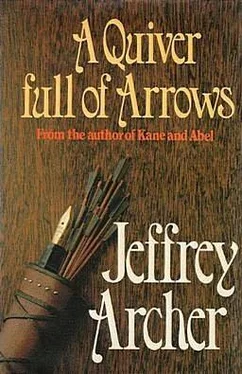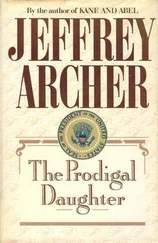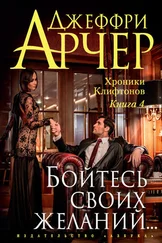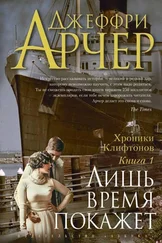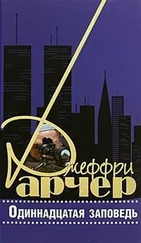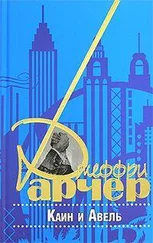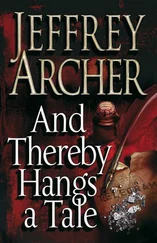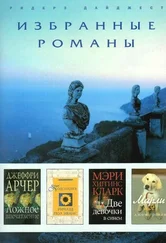When William was awarded an honorary doctorate at Princeton, Philippa attended the ceremony and sat proudly in the front row.
“I tried to secure a place at the back,” she explained, “but it was filled with sleeping students who had obviously never heard of you.”
“If that’s the case, Philippa, I am only surprised you didn’t mistake them for one of your tutorial lectures.”
As the years passed, many anecdotes, only some of which were apocryphal, passed into the Oxford fabric. Everyone in the English school knew the stories about the “fighting Hatchards.” How they spent their first night together. How they jointly won the Charles Oldham. How Phil would complete The Times crossword before Bill had finished shaving. How they were both appointed to professorial chairs on the same day, and worked longer hours than any of their contemporaries as if they still had something to prove, if only to each other. It seemed almost required by the laws of symmetry that they should always be judged equals. Until it was announced in the New Year’s Honors that Philippa had been made a Dame of the British Empire.
“At least our dear Queen has worked out which one of us is truly worthy of recognition,” she said over the college dessert.
“Our dear Queen,” said William, selecting the Madeira, “knows only too well how little competition there is in the women’s colleges: sometimes one must encourage weaker candidates in the hope that it might inspire some real talent lower down.”
After that, whenever they attended a public function together, Philippa would have the M.C. announce them as Professor William and Dame Philippa Hatchard. She looked forward to many happy years of starting every official occasion one up on her husband, but her triumph lasted for only six months as William received a knighthood in the Queen’s Birthday Honors. Philippa feigned surprise at the dear Queen’s uncharacteristic lapse of judgment and forthwith insisted on their being introduced in public as Sir William and Dame Philippa Hatchard.
“Understandable,” said William. “The Queen had to make you a Dame first in order that no one should mistake you for a lady. When I married you, Philippa, you were a young fellow, and now I find I’m living with an old Dame.”
“It’s no wonder,” said Philippa, “that your poor pupils can’t make up their minds whether you’re homosexual or you simply have a mother fixation. Be thankful that I did not accept Girton’s invitation: then you would have been married to a mistress.”
“I always have been, you silly woman.”
As the years passed, they never let up their pretended belief in each other’s mental feebleness. Philippa’s books, “works of considerable distinction,” she insisted, were published by Oxford University Press while William’s “works of monumental significance,” he declared, were printed at the presses of Cambridge University.
The tally of newly appointed professors of English they had taught as undergraduates soon reached double figures.
“If you will count polytechnics, I shall have to throw in Maguire’s readership in Kenya,” said William.
“You did not teach the Professor of English at Nairobi,” said Philippa. “I did. You taught the Head of State, which may well account for why the University is so highly thought of while the country is in such disarray.”
In the early sixties they conducted a battle of letters in the Times Literary Supplement on the works of Philip Sidney without ever discussing the subject in each other’s presence. In the end the editor said the correspondence must stop and adjudicated a draw.
They both declared him an idiot.
If there was one act that annoyed William in old age about Philippa, it was her continued determination each morning to complete The Times crossword before he arrived at the breakfast table. For a time, William ordered two copies of the paper, until Philippa filled them both in while explaining to him it was a waste of money.
One particular morning in June at the end of their final academic year before retirement, William came down to breakfast to find only one space in the crossword left for him to complete. He studied the clue: “Skelton reported that this landed in the soup.” He immediately filled in the eight little boxes.
Philippa looked over his shoulder. “There’s no such word, you arrogant man,” she said firmly. “You made it up to annoy me.” She placed in front of him a very hard boiled egg.
“Of course there is, you silly woman; look whymwham up in the dictionary.”
Philippa checked in the Oxford Shorter among the cookery books in the kitchen, and trumpeted her delight that it was nowhere to be found.
“My dear Dame Philippa,” said William, as if he were addressing a particularly stupid pupil, “you surely cannot imagine because you are old and your hair has become very white that you are a sage. You must understand that the Shorter Oxford Dictionary was cobbled together for simpletons whose command of the English language stretches to no more than one hundred thousand words. When I go to college this morning I shall confirm the existence of the word in the O.E.D. on my desk. Need I remind you that the O.E.D. is a serious work which, with over five hundred thousand words, was designed for scholars like myself?”
“Rubbish,” said Philippa. “When I am proved right, you will repeat this story word for word, including your offensive non-word, at Somerville’s Gaudy Feast.”
“And you, my dear, will read the Collected Works of John Skelton and eat humble pie as your first course.”
“We’ll ask old Onions along to adjudicate.”
“Agreed.”
“Agreed.”
With that, Sir William picked up his paper, kissed his wife on the cheek and said with an exaggerated sigh, “It’s at times like this that I wish I’d lost the Charles Oldham.”
“You did, my dear. It was in the days when it wasn’t fashionable to admit a woman had won anything.”
“You won me.”
“Yes, you arrogant man, but I was led to believe you were one of those prizes one could return at the end of the year. And now I find I shall have to keep you, even in retirement.”
“Let us leave it to the Oxford English Dictionary, my dear, to decide the issue the Charles Oldham examiners were unable to determine.” And with that he departed for his college.
“There’s no such word,” Philippa muttered as he closed the front door.
Heart attacks are known to be rarer among women than among men. When Dame Philippa suffered hers in the kitchen that morning she collapsed on the floor calling hoarsely for William, but he was already out of earshot. It was the cleaning woman who found Dame Philippa on the kitchen floor and ran to fetch someone in authority. The Bursar’s first reaction was that she was probably pretending that Sir William had hit her with a frying pan, but nevertheless she hurried over to the Hatchards’ house in Little Jericho just in case. The Bursar checked Dame Philippa’s pulse and called for the college doctor and then the Principal. Both arrived within minutes.
The Principal and the Bursar stood waiting by the side of their illustrious academic colleague, but they already knew what the doctor was going to say.
“She’s dead,” he confirmed. “It must have been very sudden and with the minimum of pain.” He checked his watch; the time was nine forty-seven. He covered his patient with a blanket and called for an ambulance. He had taken care of Dame Philippa for more than thirty years and he had told her so often to slow down that he might as well have made a gramophone record of it for all the notice she took.
“Who will tell Sir William?” asked the Principal. The three of them looked at each other.
Читать дальше
